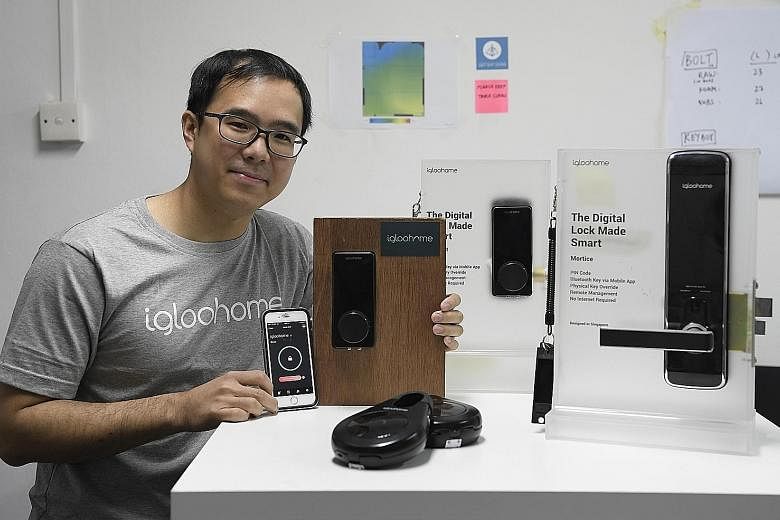Q How did igloohome come about?
A We were big proponents of the Airbnb and travel experience. We were full-time employees about a year and a half ago and we had a few rooms to rent.
As Airbnb hosts, we had a lot of issues passing the keys to renters, such as flight delays or having to pass the keys only after work. We realised that this was a major issue in key exchange not just for us, but for anyone who was renting out apartments.
We took our idea to an innovation initiative at Singtel in July 2015 and won the competition. Subsequently, we went to a start-up incubator in the United States and got our first prototype out in three months. When we graduated from the accelerator, we got really good feedback from Airbnb hosts, and felt that we were on to something that could potentially change the way people host.
Q How does your partnership with Airbnb work?
A Airbnb onboarded us as their official partner in early 2016, a few months after we started our company. Being one of the few products getting featured on Host Assist (Airbnb's marketplace to help hosts improve their service) has helped us gain access to a global audience of Airbnb hosts around the world.
Through the partnership, we got feedback from hosts in different geographies, which has been really helpful in us tailoring our technology to solve access problems. This will help us as we expand our target audience beyond just Airbnb hosts, to general rental owners, homeowners and hotels in different geographical regions.
Q How do your products work?
A The Deadbolt is a digital lock that comes with an app. It works like a bank token, which generates a one-time password without connecting to Wi-Fi.
When someone makes a reservation on Airbnb, a PIN code is sent to the guest. The guest can enter the PIN, usually several numbers, on the smart lock for access.
Our first product required Wi-Fi, which we realised posed a lot of issues as Wi-Fi connectivity can be spotty, especially for vacation homes. This is why we came up with a second version that doesn't require Wi-Fi. We are basically the first smart lock on the market that can generate a PIN code without Wi-Fi.
We just launched the Smart keybox in November for the short-term rental market and homeowners. It works in a similar way to the Deadbolt, generating a PIN code that the user uses to open the box to retrieve keys or cards.
It's an iteration of the Deadbolt, as there are some people who may not be able to change the lock on their doors. For instance, vacation homes with beautiful old doors.
In just three months, we have already made several thousand sales. Businesses, especially those in property management, are very keen on this product.
Q What was your greatest challenge, particularly since there is hardware involved in your product?
A There are a lot of people building smart locks and consumers might choose any one of us.
For us, it had been about building a product that's focused on the rental market. We partnered channel managers, who might be integrated with HomeAway and Booking.com, the major platforms for those renting out their properties.
Our product is no longer a smart lock but one that comes with additional services, like automating your rental bookings in a more efficient manner. Our challenge is building these partnerships and solving the right problem for these customers. Our next challenge is to see what kind of meaningful partnerships we can bring to home owners. We are doing beta trials such as integrating with on-demand cleaning and laundry services.
Q It is now illegal to rent out your home in Singapore for less than six months, which looks like a move that could impact Airbnb. What are your views on this since you are so closely aligned to the sharing economy?
A The fact that regulations are coming about shows that the sharing economy is a trend which everyone is accepting. The Government will make the best decisions and create the environment to both foster the benefits and manage the negatives of the sharing economy.
We see government regulation as a good sign that is beneficial to the sharing economy.
That said, the majority of our business is now selling to businesses which do property management. The Airbnb sales constitute a smaller part of our sales.
Q What are your plans this year for expansion?
A We are potentially adding more hardware to our locks. People have been asking us for features such as fingerprint sensors and cameras. We are evaluating these features and considering whether it will deviate from our business.
We opened an office in San Diego in January and have another office in Shenzhen, China.
We want to see how we can expand beyond the Asia-Pacific, which is where about 70 per cent of our sales come from. We are exploring Europe and might look into having a regional manager for Europe.


